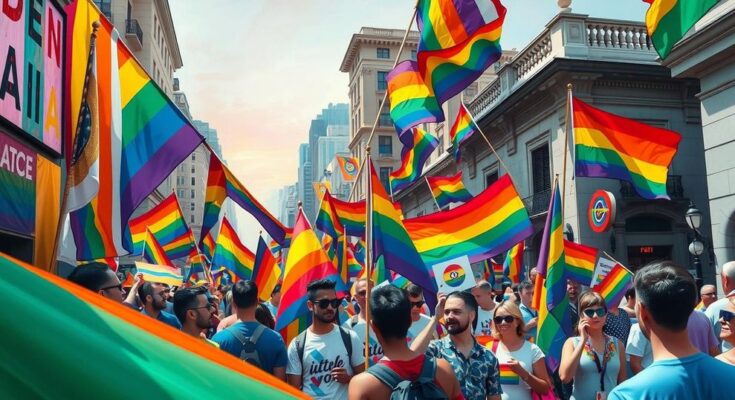On August 3, 2024, Venezuelan activist Yendri Omar Velásquez faced arbitrary detention by authorities at Maiquetía Airport while advocating for human rights at the United Nations. He was held without communication for hours before being released. Shortly after, another activist, Koddy Campos, experienced an attempted raid by alleged security agents, highlighting the severe oppression faced by citizens following the contested presidential elections on July 28, where President Nicolás Maduro claimed victory amidst widespread protests.
The crisis reveals longstanding human rights violations, especially against LGBTIQ+ individuals in Venezuela. The government’s negligence and pervasive cultural prejudices have left this community vulnerable. Nevertheless, the LGBTIQ+ movement continues to flourish, as evidenced by ongoing Pride marches in Caracas and resistance against injustices, such as the detention of 33 individuals in a sauna a year ago.
The Venezuelan situation prompts examination of the interplay between democracy and LGBTIQ+ rights. Although democracies generally promote these rights, deterioration can lead to significant rollbacks. Authoritarian regimes often target LGBTIQ+ individuals as scapegoats. Yet, even in such oppressive climates, the LGBTIQ+ movement innovates ways to resist, underscoring that democracy and respect for diversity are integral to each other.
Defining democracy extends beyond fair elections, encompassing fundamental rights such as freedom of expression and the right to assemble. Brazil’s recent local elections, which saw the election of a record number of LGBTIQ+ candidates—many of whom are women and Black—illustrate how inclusive political representation strengthens democracy.
An independent judiciary is vital for recognising LGBTIQ+ rights, with access to justice leading to meaningful legal changes. Ensuring justice access protects minority rights and safeguards democracy itself. Building a true democracy necessitates integrating civil rights with social and economic rights, protection from violence, and environmental preservation against climate change threats.
Authoritarian regimes often exacerbate social inequalities, invoking security measures that infringe upon human rights without delivering long-term solutions, disproportionately affecting marginalised groups, including LGBTIQ+ people. Environmental crises further complicate the guarantee of rights, as those most affected are often the most vulnerable.
To counter authoritarianism and support LGBTIQ+ rights, five key initiatives should be politically and financially backed. First, there must be a push to repeal laws that restrict expression and assembly, specifically anti-LGBTIQ+ legislation. Secondly, intersectional actions must be backed to bolster democracy, bringing together various marginalised groups to effect change at the local level.
Third, mapping existing resistance strategies and providing financial support can enhance these initiatives. Fourth, governments should combat technology’s role in discrimination and back tech solutions that promote LGBTIQ+ rights. Lastly, promoting LGBTIQ+ participation in democratic processes is imperative, alongside protective measures against political violence and misinformation during elections.
The article highlights recent repression faced by LGBTIQ+ activists in Venezuela following disputed elections, illustrating long-standing human rights abuses. It discusses the link between democracy and LGBTIQ+ rights, advocating for comprehensive protections beyond elections. It emphasises the importance of independent judiciaries and inclusive civil rights while proposing five key initiatives to advance LGBTIQ+ rights amid rising authoritarianism, ultimately calling for diverse and participatory democratic systems.
This exploration into the dynamics of democracy and LGBTIQ+ rights reveals the critical need for integrity in democratic systems. The interconnectedness of human rights for all, particularly marginalized communities, underlines the necessity for collective action and support. The ongoing efforts of LGBTIQ+ activists exemplify resilience amidst adversity, demonstrating that a robust democracy must embrace diversity and safeguard every citizen’s rights. Only through united initiatives can societies combat authoritarianism and foster truly inclusive democracies.
Original Source: www.openglobalrights.org



